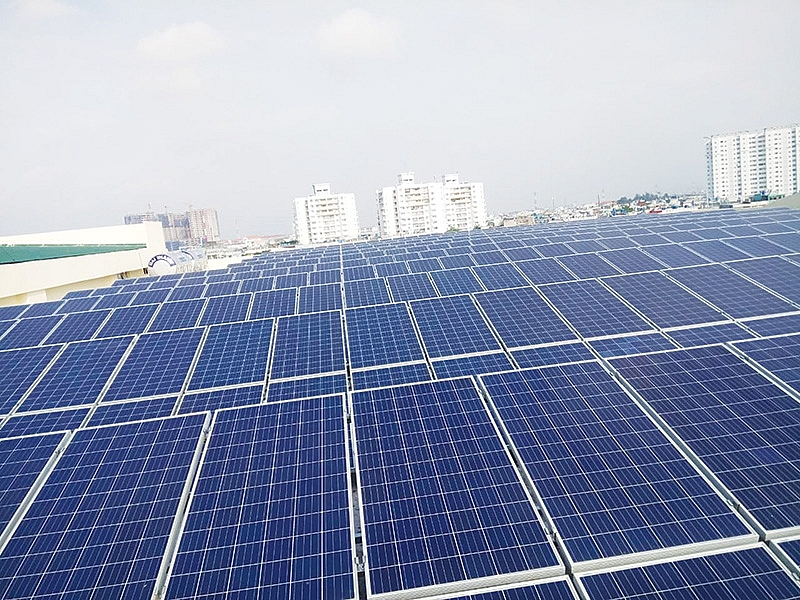Home solar system shines in Vietnam
 |
Hundreds of households have been benefiting from homegrown solar power systems. Nguyen Thanh Nga, a resident in Ho Chi Minh City’s Phu Nhuan district who is using a rooftop solar photovoltaic system called BigK, said, “We save 30 per cent on our monthly electricity bill with this.”
SolarBK’s BigK solar programme, with its international-standard quality guarantee and reasonable prices, attracted more than 450 residents who installed capacity varies from two kilowatt-peak (kWp) to 20kWp in just eight months since it launched BigK solar programme in 2018. Based on a statistic from Electricity of Vietnam, the number of resident rooftop installations of SolarBK expected to account for more than 40 per cent of total. Users of rooftop solar power will be insured for the first time in Vietnam under a deal among solar energy solutions provider SolarBK Holdings, Bank for Investment and Development of Vietnam (BIDV), and BIDV Insurance Corporation (BIC).
Keeping solar power hot after FiT deadline
Commercial and industrial solar PV rooftop applications have great development potential, and promise interesting investment opportunities for the private sector in Vietnam. Besides households, deploying solar energy at production sites would help manufacturing industries improve the reliability of their power supply and reduce their demand for non-renewable power. This would also bring significant savings for the commercial and industrial sector on electricity consumption.
Rooftop solar panels have never been more affordable for home and business owners and communities, and they can now help households halve their monthly electricity bills, while contributing to environmental protection.
Mai Van Trung, business development director at SolarBK, told VIR, “The percentage of households with a solar PV system is quite modest. However, it is a good signal as rooftop solar panels have never been more affordable for homeowners and they are now more aware of using solar energy, especially since the issuance of the prime minister’s Decision No.11/2017/QD-TTG dated April 1, 2017 on mechanisms for encouraging the development of solar power, with an approved feed-in tariff (FiT) rate of 9.35 US cents.”
Vietnam changed the trading method for rooftop solar projects by replacing the net-metering method with the direct consumption-direct supply method. It issued Decision No.02/2019/QD-TTg dated January 8, 2019 on amending several clauses of Decision 11. Previously, electricity sellers that sourced from rooftop solar projects were required to sell to consumers based on the net-metering method with two-way electricity meters installed.
In another positive movement, given that Decision 11 and the 9.35 US cents per kilowatt hour (kWh) FiT is only in effect until June 30, the Ministry of Industry and Trade’s (MoIT) draft decision would provide for a new FiT programme for an additional two years from July 1, 2019 to June 30, 2021 for solar power projects in Vietnam.
Unlike the first FiT, establishing one FiT rate for all solar power projects, the draft decision proposes varying levels of tariffs according to location and technology, classified by four different irradiance regions and involving four different solar power technologies. Specifically, the draft provides for a wide range of tariffs from 6.67 to 10.87 US cents per kWh.
“The potential of solar energy development in Vietnam, especially rooftop PV, is huge, not only for domestic project developers but also for foreign partners and investors. The race to rooftop will remain hot even after the June 30 deadline,” remarked Trung who will be a speaker of the topic “Rooftop solar after July 2019: Insights from insiders” within the event “The Solar Show Vietnam 2019” orgnanised this week.
 |
| Vietnam’s energy sector must adapt to the higher demand and the rise of independent power generation |
 |
Preparing for next phase
The high power demand is urging the sector to adapt to an expected explosion in independent power generation – including from households with rooftop solar panels.
SolarBK is the only local firm to have completed a vertical integration strategy for the solar sector so far. Following a series of internal clean energy shows, SolarBK with booth at 3E10 in The Solar Show Vietnam 2019 will continue to confirm the field of home position and made-in Vietnam products and solution. SolarBK is also one of the few companies in Vietnam that is capable of professionally and efficiently performing engineering, procurement and construction (EPC).
“SolarBK believes that everything should start from its core. We hope that our solar power solutions will continue to spread, especially in the education field. We hope that it will stimulate the youth to work together for a future where Vietnam becomes a global leader of renewable energy,” reads the company’s website.
In addition, SolarESCO, a member of SolarBK Group, is a financial solution for enterprises looking for solar power for their operations, with flexible payment methods. Once an enterprise meet ESCO’s criteria, it will receive investment for the entire system.
ESCO, or Energy Secure Company, will implement energy service packages including planning, construction, installation, operation and maintenance, optimisation, and financial contribution, among others. By using the ESCO solution, enterprises will not have to pay enormous investment expenses to acquire their own economical solar power system. After the leasing contract is finished, SolarESCO will hand over the system, and the business will inherit savings without having to pay additional fees.
In order to help the development of the solar power market and the ESCO model, it is necessary to sponsor financial institutions. In fact, in the past, most banks were reluctant to grant investment capital to enterprises. However, thanks to the expansion of the market and the ever-improving policies, along with the encouragement of calling for investment, banks have joined the market, helping the solar market to tap into its full potential.
ESCO programme participants commented that it helped reduce costs as well as improve their firms’ image in the market. Nguyen Thanh Son, director of Tan Cang-Song Than ICD, Vietnam’s first solar-powered green logistics centre, said, “The green logistics trend has been sweeping across the globe for years now, and customers increasingly attach environmentally-friendly clauses to business contracts.”
Fresh innovations
SolarBK constantly updates trends for advanced technology and services to enhance the competitiveness and confirmed our market leader’s advantages. SolarBK’s R&D room was built and equipped with modern facilities.
For customers, in addition to the controller, intelligent auxiliary equipment, SolarBK has researched and successfully developed Solar System Operation Center (SSOC ™), which is also Vietnam’s first solution that implemented by Vietnamese engineers and allows customers to monitor and have online control clean energy systems.
SSOC™ is vertically integrated into SolarBK’s full-package solutions, offering substantial benefits to optimize the management process and foster the use of clean energy in Vietnam. A winning combination of smart grid, distributed renewable energy sources, and blockchain could trigger an energy revolution the likes of which has never been seen before. In this context, blockchain in particular enables so-called peer-to-peer transactions. The innovation behind blockchain is that transactions are no longer stored in a central database, but distributed to all participating computers, which store the data locally.
Trung from SolarBK told VIR that end users who directly trade electricity with each other get a better rate than from the utility, while the buyer also gets the energy at a discount rate. “Peer-to-peer energy trading is becoming a reality with the help of blockchain. Most energy transactions are complex due to involvement of many parties and regulations. Blockchain can remove the complexities and let end users deal with each other, while still providing them a secure environment to do so,” said Trung.
What the stars mean:
★ Poor ★ ★ Promising ★★★ Good ★★★★ Very good ★★★★★ Exceptional
 Tag:
Tag:
Related Contents
Latest News
More News
- Bac Ai Pumped Storage Hydropower Plant to enter peak construction phase (January 27, 2026 | 08:00)
- ASEAN could scale up sustainable aviation fuel by 2050 (January 24, 2026 | 10:19)
- 64,000 hectares of sea allocated for offshore wind surveys (January 22, 2026 | 20:23)
- EVN secures financing for Quang Trach II LNG power plant (January 17, 2026 | 15:55)
- PC1 teams up with DENZAI on regional wind projects (January 16, 2026 | 21:18)
- Innovation and ESG practices drive green transition in the digital era (January 16, 2026 | 16:51)
- Bac Ai hydropower works stay on track despite holiday period (January 16, 2026 | 16:19)
- Fugro extends MoU with PTSC G&S to support offshore wind growth (January 14, 2026 | 15:59)
- Pacifico Energy starts commercial operations at Sunpro Wind Farm in Mekong Delta (January 12, 2026 | 14:01)
- Honda launches electric two-wheeler, expands charging infrastructure (January 12, 2026 | 14:00)






















 Mobile Version
Mobile Version